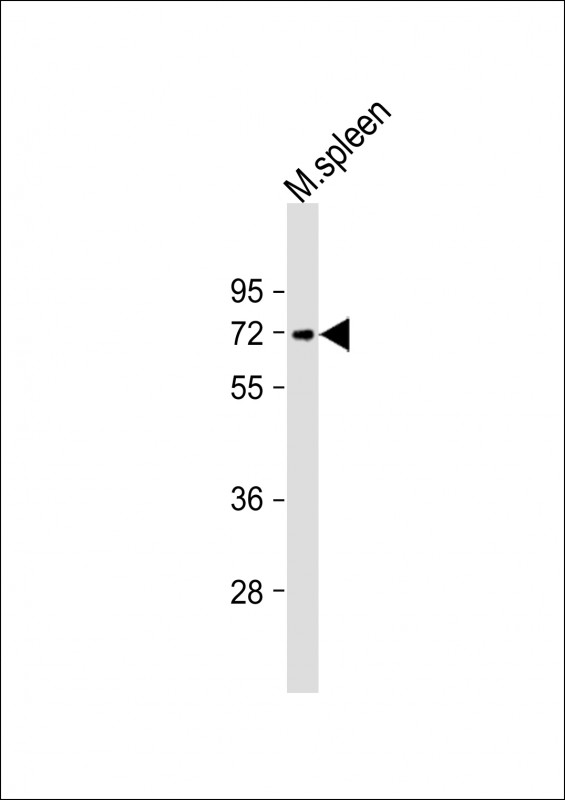

| WB | 1/1000 | Human,Mouse,Rat |
| IF | 咨询技术 | Human,Mouse,Rat |
| IHC | 咨询技术 | Human,Mouse,Rat |
| ICC | 技术咨询 | Human,Mouse,Rat |
| FCM | 咨询技术 | Human,Mouse,Rat |
| Elisa | 咨询技术 | Human,Mouse,Rat |
| Aliases | TGF-beta receptor type-2, TGFR-2, TGF-beta type II receptor, Transforming growth factor-beta receptor type II, TGF-beta receptor type II, TbetaR-II, Tgfbr2 |
| Entrez GeneID | 21813 |
| WB Predicted band size | 67.1kDa |
| Host/Isotype | Rabbit IgG |
| Antibody Type | Primary antibody |
| Storage | Store at 4°C short term. Aliquot and store at -20°C long term. Avoid freeze/thaw cycles. |
| Species Reactivity | Human, Mouse |
| Immunogen | This Mouse Tgfbr2 antibody is generated from rabbits immunized with a KLH conjugated synthetic peptide between 548-575 amino acids from the C-terminal region of mouse Tgfbr2. |
| Formulation | Purified antibody in PBS with 0.05% sodium azide. |
+ +
以下是关于Mouse Tgfbr2抗体的3篇参考文献示例(注:文献信息为示例性内容,具体需根据实际研究补充):
1. **"Conditional knockout of TGF-β receptor II in myeloid cells attenuates hepatic fibrosis in mice"**
- **作者**: Yamazaki, S. et al.
- **摘要**: 本研究利用Tgfbr2条件性敲除小鼠模型,结合特异性抗体验证髓系细胞中受体缺失,证实TGF-β信号在肝纤维化中的作用。通过Western blot和免疫组化检测Tgfbr2蛋白表达,揭示其调控肝星状细胞活化的机制。
2. **"TGF-β receptor II regulates stromal cell plasticity in tumor microenvironment"**
- **作者**: Akatsu, Y. et al.
- **摘要**: 通过免疫荧光和流式细胞术,使用抗Tgfbr2抗体分析肿瘤相关成纤维细胞(CAFs)中的受体表达。研究发现Tgfbr2缺失抑制肿瘤生长,抗体验证了受体表达与基质重塑的关联。
3. **"Loss of TGF-β receptor II in T cells leads to spontaneous autoimmunity"**
- **作者**: Li, M.O. et al.
- **摘要**: 利用T细胞特异性Tgfbr2敲除小鼠,结合抗体检测受体蛋白水平,揭示TGF-β信号维持T细胞耐受的关键作用。免疫沉淀和Western blot证实受体缺失引发自身免疫表型。
4. **"TGFBR2 deficiency in pulmonary fibroblasts exacerbates lung fibrosis"**
- **作者**: Santiago, B. et al.
- **摘要**: 研究通过免疫组化及Western blot,使用抗Tgfbr2抗体分析肺成纤维细胞受体表达,发现受体缺失导致TGF-β信号异常激活,加重博来霉素诱导的肺纤维化。
建议通过PubMed或Google Scholar以关键词“Tgfbr2 antibody mouse”检索最新文献获取准确信息。
The mouse Tgfbr2 antibody is a crucial tool for studying the transforming growth factor-beta (TGF-β) signaling pathway, which regulates diverse cellular processes, including proliferation, differentiation, apoptosis, and immune responses. TGFBR2 (TGF-β receptor type II) is a transmembrane serine/threonine kinase receptor that binds TGF-β ligands, forming a complex with TGFBR1 (type I receptor) to initiate downstream signaling via Smad proteins and non-canonical pathways. Dysregulation of TGFBR2 is linked to fibrosis, cancer, and autoimmune diseases.
This antibody specifically detects mouse TGFBR2. enabling researchers to investigate its expression, localization, and function in murine models. It is commonly used in techniques like Western blotting, immunohistochemistry (IHC), immunoprecipitation (IP), and flow cytometry. Validation often includes knockout controls to confirm specificity.
Studies utilizing this antibody have advanced understanding of TGF-β signaling in development, tissue homeostasis, and disease. For example, it has been instrumental in exploring TGFBR2's role in tumor suppression versus cancer progression, epithelial-mesenchymal transition (EMT), and immune cell regulation. Researchers also employ it in preclinical models to evaluate therapeutic strategies targeting TGF-β pathways.
Commercial Tgfbr2 antibodies are typically monoclonal or polyclonal, with host species like rabbit or rat. Optimal performance depends on proper experimental conditions, including tissue preparation and antibody dilution. Always verify datasheets for application-specific validation.
×